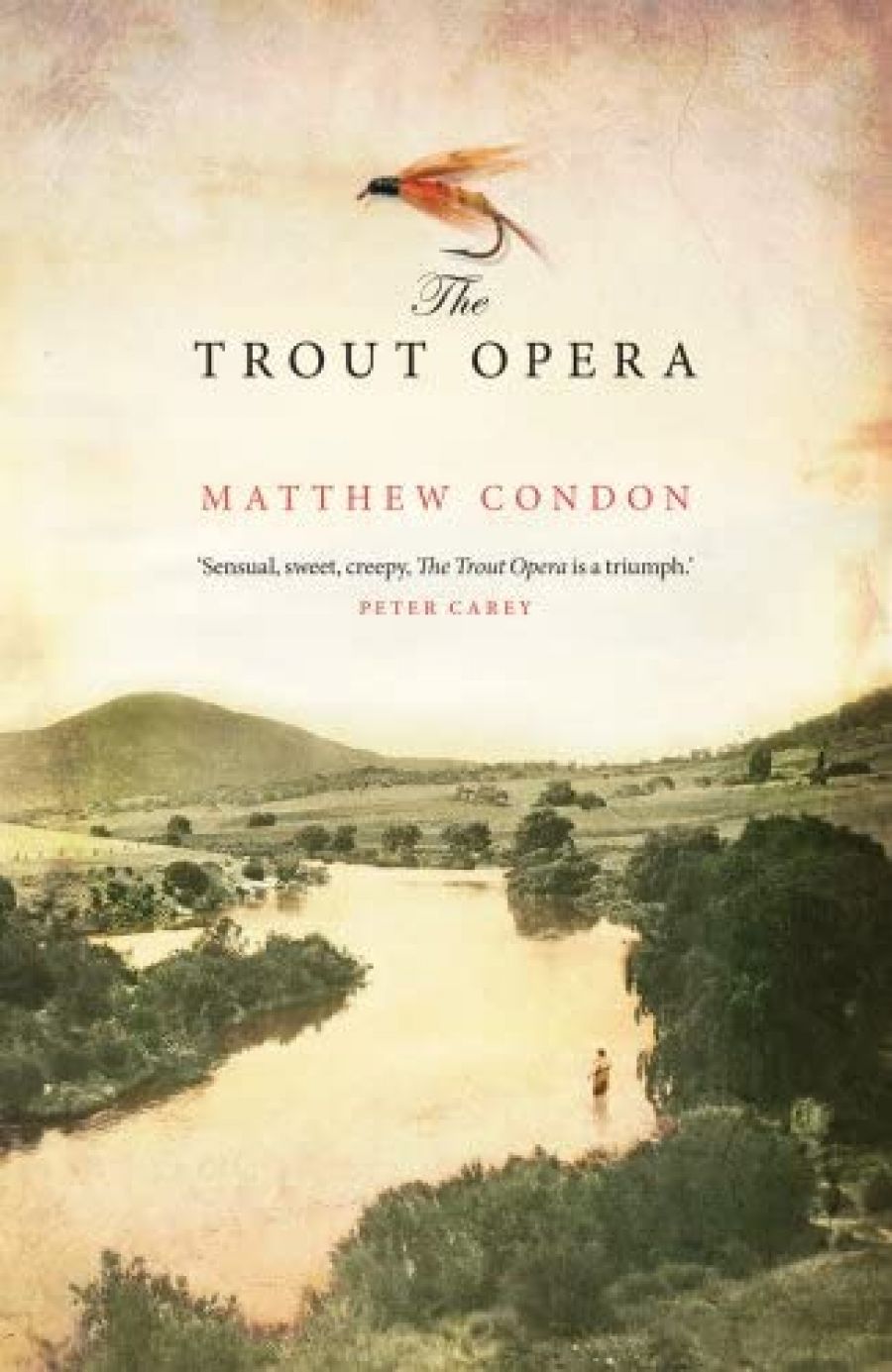
- Free Article: No
- Contents Category: Fiction
- Review Article: Yes
- Article Title: Dark path
- Online Only: No
- Custom Highlight Text:
Ten years in the making, Matthew Condon’s vibrant modern epic, The Trout Opera, has been worth the wait. It has an expansiveness and generosity of spirit that has become uncommon in Australian fiction (unless we think of an altogether different book, but on a similar scale, Alexis Wright’s Carpentaria, 2006). Sent in 1996 to report on the slow death of the Snowy River, Condon met the storied old-timer Ron Reid, who in his more than eighty years had rarely left the Dalgety region. From Reid’s yarns came the germ of a novel. Essentially, it is an affectionate and many-stranded variation on that old cultural chestnut in Australia: the search for the original of ‘Banjo’ Paterson’s ‘The Man from Snowy River’.
- Book 1 Title: The Trout Opera
- Book 1 Biblio: Vintage, $32.95 pb, 592 pp
- Book 1 Readings Link: booktopia.kh4ffx.net/4eAy93
Condon imagines how, in 2000, the search is on in earnest. Olympic officials have elected the soon-to-be centenarian Wilfred Lampe as the embodiment of one hundred years of the national history. They want to make him the pivot of the opening ceremony at the Sydney Games. Willing or not, he will be ‘our perfect candidate for the ceremony of a lifetime’. Accordingly, two functionaries are dispatched from Sydney to retrieve Lampe from his shack outside Buckley’s Crossing. But in a novel of many searches, this one will prove as difficult to complete as the others, whether they are for lost children, or sisters, or indeed the source of the Snowy River.
As the novel reaches backwards and forwards across the whole span of the twentieth century, we first encounter an apparition, a large tin trout carefully manoeuvring itself along a bridge over the Snowy. Inside is six-year-old Wilfred Lampe, on his way to perform the key role of the King Trout of the Monaro in the entertainment dreamt up by the school principal, German-born Mr Schweigestill. This is ‘the Trout Opera’ of the book’s title. It is a celebration of the natural abundance of the region and of the historical moment when trout ova were first imported to Australia. An exuberant misadventure, the opera sets the tone for much of what is to follow.
Yet this is a story in which the ‘dark path’ tempts a number of characters. There are drug addicts, dealers, lords (in the latter role, a sentimental Italian criminal called Joe Panozza). There are lost children, victims of accident, death in infancy. Astrid Lampe, Wilfred’s beloved younger sister, links the two main kinds of lost child story of the Australian experience: rural and urban. First she is lost when very young in the bush and the whole community is mobilised in the search for her, as in the nineteenth-century narratives of Kingsley, Clarke, Lawson, and Furphy. Years later, she vanished into the city, abandoning her child, becoming irretrievably lost to her family. How Astrid’s fate is discovered is one of the many intertwined lines of plot dexterously managed by Condon.
There are numerous others, notably the plangent story of the once tumultuous river, now silted with algae. As Wilfred laments, ‘I was a fisherman, before the river went away.’ While a boy, crossing the mountains on a cattle drive into Gippsland with his father, Wilfred encountered an eccentric scientist called Wragge, who confided his dream of a vast power scheme, with tunnels taller than a man. Mocked then (to the extent that he decamped to New Zealand), Wragge’s dream came true. In the 1940s, when Wilfred found work as a guide to the hydroelectric planners, ‘the whole world washed up against the mountains after the war’. The Trout Opera also focuses on Wilfred’s grand-niece, Aurora Beck, granddaughter of Astrid, who ran away from a Murwillumbah cane farm after her mother’s suicide. In pursuit of her is the vicious junkie Wynter, a victim of child abuse who seeks vengeance against the world in Condon’s somewhat overdetermined order of things. This is how the young woman is introduced: ‘At 6.17 a.m. Aurora Beck was woken again by the dream, and had cocaine for breakfast.’ The arresting attack of Condon’s chapter openings is one of the stylistic pleasures of the book. Let another example suffice, a variation on dreaming: ‘They secretly assembled the Dream [that is the stage set for the Olympic ceremony] in an old railway depot in Redfern.’ Condon is equally deft with similes – husbands ‘as lumpy as a fleece bale’ – and with a leisurely, sympathetic language to describe country people, ‘stockmen and herders hypnotised by the straw-coloured horizons of their daily lives’.
Aurora Beck and her great-uncle Wilfred Lampe are united in the grand fantasy of The Trout Opera. With the aid of a transsexual drug dealer, Tick, she kidnaps Wilfred from a Sydney hospice to take him home to Dalgety. It is a scenario reminiscent of Les Murray’s brilliant verse novel, The Boys Who Stole the Funeral (1980). ‘Ordinary’ Australians abet the escape, with gifts of food and safe conduct. On his way home, the old man is ‘shepherded, closeted, fed and hidden by a string of semitrailer drivers’. With so many characters in play, Condon cannot do justice to all of them: to Graham Featherstone, early morning DJ, ‘Friend of the Sleepless’; to Lily May Prescott, counsellor to Aurora but also custodian of another lost child story. Yet as the novel reaches its unexpectedly radiant and surprising conclusion, Condon has led us on an enriching, untidy, satisfying journey.


Comments powered by CComment